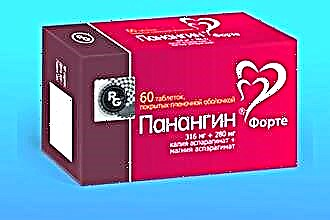People who have any cardiac pathology are more likely to suffer from diseases of the lungs and upper respiratory tract of an inflammatory nature. Sometimes it happens that a person comes to the doctor with complaints of, as it seems to him, a cold cough. And after the examination, it turns out that there is no cold, but there are problems with the cardiovascular system. For example, a debilitating cough that increases with exercise and keeps you awake while lying down is one sign of heart failure. This is what a heart cough really is. To treat a cough with heart failure begins with a detailed examination and normalization of the heart.
Heart failure is the end result of cardiac decompensation ailments. It leads to stagnation of venous blood. Such a violation of blood circulation (more precisely, its failure in the lungs) will certainly provoke a spasm bronchi... It occurs almost simultaneously with vasospasm. This allows us to say that it is precisely the cough of cardiac origin that is observed. Let's try to figure out why a cough appears with heart disease, what ailments it indicates and how to eliminate it.
How is it developing
 The small circle of blood flow is responsible for the supply of blood to the lungs. Its usefulness depends mainly on how well the left cardiac ventricle and atria are functioning. Note that cardiac cough develops in stages. Let's see how this happens:
The small circle of blood flow is responsible for the supply of blood to the lungs. Its usefulness depends mainly on how well the left cardiac ventricle and atria are functioning. Note that cardiac cough develops in stages. Let's see how this happens:
- Due to the disease-causing processes occurring in the left ventricle, its ability to contract is reduced. Thus, he is no longer able to fully pump blood into the aorta, which comes from the arteries in the lungs. Such unhealthy changes provoke an increase in pressure in the lungs and a decrease in the intensity of microcirculation in them of blood.
- Due to the slow blood flow, pressure in the veins rises, and tissues begin to suffer due to oxygen deprivation.
- Lack of oxygen leads to the deposition of collagen fibers on the walls of small vessels and on the septa between the alveoli. This, in turn, creates conditions for the development of pneumosclerosis.
- There is a gradual hardening, and then obliteration (overgrowth of connective tissue) of thin vessels in the lungs. Because of this, blood flow in the lungs decreases even more, and the level of pressure in the vessels increases.
- When the pressure in the pulmonary artery increases, the load on the left ventricle increases, as a result of which its hypertrophy occurs.
- The next stage is characterized by dilatation (enlargement) of the right side of the heart. This is the reason for the stagnation of blood in a large circle of blood flow. Its liquid components penetrate the lung tissue and irritate bronchial receptors. At this stage, the person has the same heart cough. Its course is chronic. Usually begins to annoy in a horizontal position. Exacerbations are recorded most often in the evening and at night.
- If cardiac pathology is significantly complicated (arrhythmia, another heart attack, ventricular fibrillation, and so on), then there is a high risk of developing acute left ventricular failure. When it progresses too quickly, it can lead to so-called cardiac asthma or pulmonary edema.
The main signs
Since a cough in itself is a symptom of many ailments, it is sometimes extremely difficult to determine the signs of a cough of a cardiac origin. True, it has several specific features. By them, it can be recognized and distinguished from a cough with a cold or bronchitis.
So, how to distinguish a heart cough from a cold:
 If it is cordial, then the cough will certainly be dry. With it, a person does not separate mucous sputum or pus. Although, if the attack is acute, discharge with an admixture of blood may well appear.
If it is cordial, then the cough will certainly be dry. With it, a person does not separate mucous sputum or pus. Although, if the attack is acute, discharge with an admixture of blood may well appear.- The cough is accompanied by cyanosis (blue discoloration), which usually affects the lips, nasolabial triangle, earlobes, or fingertips.
- Tachycardia. At first, a cough with shortness of breath occurs only with physical exertion. However, as the disease progresses, an attack of debilitating cough with rapid breathing can provoke even a prolonged conversation.
- Pain in the region of the heart. Their reason is the congestion of the heart muscle with blood.
- The condition preceding fainting, or fainting itself. They occur due to increased pressure in the chest and a decrease in the volume of blood that flows to the heart.
- Distended veins in neck with cough.
- The emergence or strengthening when making an attempt to take a horizontal position. The reason - in this position, the left ventricle is overloaded. Because of this, some people are forced to sleep in a semi-sitting position. The same symptom is observed in those who suffer from bronchial asthma. Obviously, in this case, the disease needs to be differentiated.
- At the very beginning of the disease, cough is accompanied by dizziness, increased sweating and significant weakness. Then in the evenings the ankle swells. If the disease progresses, the swelling becomes denser, becomes more stable and does not disappear in the morning.
What heart problems does cough talk about?
Often, a cough that appears suddenly is associated with acute respiratory viral infections, bronchitis, or allergies. Even in spite of the fact that it is not quite usual due to the absence of other symptoms characteristic of the named diseases.
By the nature of the cardiac cough, one can assume exactly where and in what circle of blood flow the pathology is located. This is very important for diagnosis.
 A dry cough in the form of seizures, which is accompanied by shortness of breath, indicates stenosis (persistent narrowing) of the mitral valve. It appears as a result of a sudden expansion of the left atrium in volume. In some cases, it is accompanied by coughing up blood, weakness, low-grade fever and increased sweating.
A dry cough in the form of seizures, which is accompanied by shortness of breath, indicates stenosis (persistent narrowing) of the mitral valve. It appears as a result of a sudden expansion of the left atrium in volume. In some cases, it is accompanied by coughing up blood, weakness, low-grade fever and increased sweating.
A loud, debilitating cough that occurs in the evenings when trying to take a horizontal position may indicate chronic left ventricular failure. Attacks can happen several times at night. A person, feeling suffocated, constantly wakes up. Sometimes it is difficult for him to clear his throat. However, when it is possible to do this, the condition is relieved.
An irritating cough suggests that pulmonary congestion has not yet affected the systemic circulation. But if he has already managed to go far enough, then when coughing, sputum with an admixture of brown may appear. This is the result of the breakdown of red blood cells that have left the microcirculation.
Brief and violent coughing fits accompanied by pain in the region of the heart or chest may indicate rheumatism with a complication of pericarditis. If blood is coughing up when coughing, there is reason to suspect thromboembolic syndrome, indicating severe pulmonary congestion. It appears as a result of progressive right heart failure associated with atrial fibrillation.
In children, this cough is usually a symptom of increased pulmonary artery pressure. It is fixed if there is a congenital heart defect, which involves the enrichment of the small circle of blood flow.
How to treat
Is it possible to somehow fight a heart cough? Sure. But eliminating the symptom is impossible without eliminating the cause that caused it. Therefore, first of all, it is necessary to treat the main ailment - cardiac pathology. A cardiologist is doing this. To alleviate the symptom, the following drugs are traditionally used:
- cough medicines with anesthetic effect - to cough up or thin phlegm (if necessary);
- vasodilators - for vasodilation (Atakand, Losartan);
- diuretics - to remove excess fluid, reduce edema and reduce the additional load on the blood flow system ("Veroshpiron", "Indapamide");
- if coughing up blood, the doctor prescribes an R-graphy - an examination to find the place where the blood is coming from, and also recommends donating sputum for bacterial culture (if the cough really has a cardiac origin, siderophages will be identified in it - cells indicating the presence of a heart defect) ... Self-medication in this case is strictly prohibited. The patient must be in a hospital under the supervision of doctors.
It is undesirable to be treated with folk remedies for heart cough. The fact is that medicinal herbs used to prepare homemade medicines can have different effects on the heart and blood vessels.
However, if you are determined to try something from the arsenal of "grandmother's" recipes, first consult with your doctor. You can use infusions and decoctions prepared with your own hands only with his permission.
General recommendations
If it turns out that a dry cough is still associated with some kind of heart disease, it should be treated in a comprehensive manner. What is meant?
First of all, you must adhere to an adequate daily regimen. Normalization and a clear distinction between the periods of work and rest are extremely important in any cardiac pathology.
Daily nutrition should be complete and healthy. It is necessary to fill the diet with fresh herbs, vegetables and fruits, low-fat meat and dairy products, baked, boiled or steamed dishes. We'll have to give up preservation, pickled, salty, spicy and smoked foods and products, as well as food enriched with cholesterol.
It will be necessary to part with addictions. It is recommended that you eliminate cigarettes and alcohol from your life forever.
Learning to deal with stress is important. It is, of course, not possible to completely eliminate unpleasant moments. However, learning to control your nerves can be very beneficial.
Oxygen therapy should not be abandoned. This treatment will reduce shortness of breath, relieve tachycardia, increase physical activity, and improve mood and sleep.
Let's summarize
 Heart cough is the first bell of many vascular and heart diseases and a significant reason to see a specialist. Not everyone can independently recognize it and distinguish it from a cold symptom. It is especially difficult for people who are far from medicine. Indeed, in some cases, it may be absolutely no different from a cough with bronchitis. Knowledge of the accompanying symptoms and the mechanism of its development will help to take the right measures in a timely manner. In this case, we are not talking about self-medication. But it is recommended to contact a doctor as soon as possible.
Heart cough is the first bell of many vascular and heart diseases and a significant reason to see a specialist. Not everyone can independently recognize it and distinguish it from a cold symptom. It is especially difficult for people who are far from medicine. Indeed, in some cases, it may be absolutely no different from a cough with bronchitis. Knowledge of the accompanying symptoms and the mechanism of its development will help to take the right measures in a timely manner. In this case, we are not talking about self-medication. But it is recommended to contact a doctor as soon as possible.
A heart cough may well be a sign of a very dangerous disease, as well as be complicated by life-threatening pulmonary edema and cardiac asthma.
For the treatment to be as effective as possible, you need to identify the exact cause of such a cough. Therapy is prescribed in accordance with the detected problems in the functioning of the heart. It can be not only conservative - sometimes there is a need for surgical intervention.

 If it is cordial, then the cough will certainly be dry. With it, a person does not separate mucous sputum or pus. Although, if the attack is acute, discharge with an admixture of blood may well appear.
If it is cordial, then the cough will certainly be dry. With it, a person does not separate mucous sputum or pus. Although, if the attack is acute, discharge with an admixture of blood may well appear.

